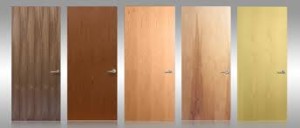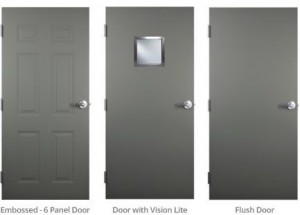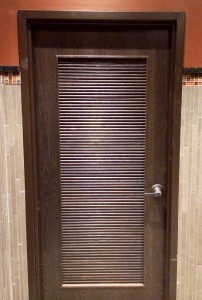W hen selecting doors for your facilities, do you take into account the types of materials used in their manufacturing? Depending on if you’re choosing a door that will be faced with the harsh elements of the outdoors or if you’re simply looking for an interior door that will handle a lot of foot traffic, the type of material used is something that needs to be taken into account. After all, if you use the wrong door in the wrong application, you’re ultimately going to be faced with some unwanted maintenance issues that could’ve been avoided. This begs the question:
hen selecting doors for your facilities, do you take into account the types of materials used in their manufacturing? Depending on if you’re choosing a door that will be faced with the harsh elements of the outdoors or if you’re simply looking for an interior door that will handle a lot of foot traffic, the type of material used is something that needs to be taken into account. After all, if you use the wrong door in the wrong application, you’re ultimately going to be faced with some unwanted maintenance issues that could’ve been avoided. This begs the question:
“What types of details do I need to take into consideration when choosing my door materials?”
This article discusses five of the most popular door materials and what application they’re best suited for.
Types of Door Materials
Stainless Steel
Stainless steel is a material that works equally as well in both exterior and interior applications.
Edging out its cousin, hollow metal, in the durability and weather and chemical resistance departments, stainless steel’s natural resistance to corrosion makes it a great option for doors that are going to be faced with high salt contents and chemical applications.
Stainless steel also isn’t as prone to rust. Plus, these doors can be disinfected without affecting the finish of the door. The same can’t be said for hollow metal doors. All of these reasons make stainless steel doors the top choice for restaurant doors.
However, stainless steel does have a couple of downfalls. It’s more expensive than hollow metal and they aren’t as well insulated. On top of that, they’re pretty limited in design.
Hollow Metal
Speaking of hollow metal, it’s also a popular component when it comes to both interior and exterior door applications. Hollow metal doors are made of cold-rolled steel and can take quite a bit of abuse.
Typically, we recommend using hollow metal doors for stock room doors, an area where you are continuously moving your product in and out. As you are well aware, stock carts often crash into these doors, and hollow metal doors are able to take the wear and tear.
These doors usually aren’t affected by weather, making them perfect for exterior door applications; however, a good coat of paint is key in keeping the rust at bay.
Yes, I DID just mention the “R” word – rust – and it’s true; hollow metal doors will eventually rust. It’s also important to note that due to the way they’re constructed, they tend to let heat and cold escape. They’re also limited in their design and finish; however, if you want the look of a wood door, CurriStain doors are stamped and hand-stained to look just like a wood door. Another downside of hollow metal is that if you need to disinfect the door you run the risk of harming the finish in the process.
Fiberglass
Fiberglass is another option when it comes to door materials and is typically used for exterior door applications.
Unlike the aforementioned hollow metal and stainless steel doors, there are actually many different design options available. If you have your heart set on a wood door but are afraid it won’t hold up to the elements, take a look at your fiberglass options. They actually make fiberglass doors that look exactly like wood doors.
Fiberglass doors can withstand chemicals and harsh elements very well, plus, they have that added benefit of being less expensive than stainless steel doors.
While these doors are durable, they don’t hold a candle to stainless steel doors so it’s important to keep that in mind. Using disinfectant is also a no-no with fiberglass; you can possibly damage the finish.
 Wood
Wood
Wood doors are mainly used for interior door applications.
These are probably some of the most beautiful doors available with their seemingly endless design and finish options. From detailed carvings on panel doors to sleek and sexy flat doors, the options for wood doors are there for the taking. Dampening sound and great for keeping the heat/cold in or out as needed are just two of their impressive features. The great part? These doors are typically more affordable as long as you aren’t ordering exotic wood species and lavish designs.
Of course, with the good come a few downsides as well. Changing climate conditions are not friendly to wood doors as they can swell and warp if the changes are rapid enough or if the humidity is high enough. Getting them wet can damage the finish which makes disinfecting them fairly difficult. It’s for this reason that they aren’t recommended for any exterior applications.
Laminate
Looking for interior door applications? Laminate might be your answer.
Even though some might claim otherwise, if laminate doors are properly manufactured they’re actually quite durable. Of course, the key to that statement is the whole “properly manufactured” part. You’ll want to stay away from doors that are laminated in the field as they can be prone to chipping and peeling.
Like wood doors, laminate doors offer a wide variety of exotic designs at a very reasonable price. On top of that, they’re easy to clean and disinfect.
The downsides to laminate doors come twofold. First, you can’t use them outside. They just can’t withstand the elements. Second, as I just discussed, if they aren’t properly manufactured or if they’re field laminated, you can run into issues with peeling, cracking and chipping. Unfortunately, all of these things are difficult to aesthetically repair when it comes to laminate doors.
That’s a lot of information to take in so if you have any other questions on choosing a door, feel free to give us a shout. We’d be more than happy to help.

I agree that you need to consider the type of material you want your door to be made out of, especially if it is an exterior door. It’s important that your door is durable enough for the elements and provides you with needed security. In the end, everyone in the building should feel safe knowing that the door is secure at potentially dangerous times.
That’s a good point that metal doors are very durable. You could probably bang out a dent if it did get damaged. I might have to try a door like that for my shed.